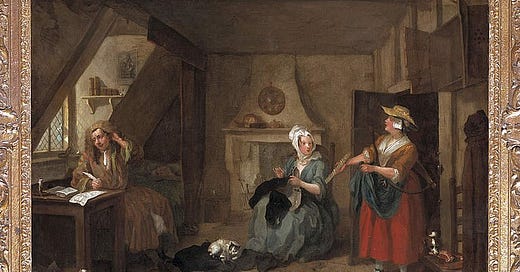Laughing at ‘dull Rhimes’
Alexander Pope beautifully articulates some 'Crimes' against poetry in this passage from 'An Essay on Criticism' (1711)
But most by Numbers judge a Poet’s Song, And smooth or rough, with them, is right or wrong; In the bright Muse tho’ thousand Charms conspire, Her Voice is all these tuneful Fools admire, Who haunt Parnassus but to please their Ear, Not mend their Minds; as some to Church repair, Not for the Doctrine, but the Musick there. These Equal Syllables alone require, Tho’ oft the Ear the open Vowels tire, While Expletives their feeble Aid do join, And ten low Words oft creep in one dull Line, While they ring round the same unvary’d Chimes, With sure Returns of still expected Rhymes. Where-e’er you find "the cooling Western Breeze," In the next Line, it "whispers thro’ the Trees": If "Chrystal Streams with pleasing Murmurs creep", The Reader’s threaten’d (not in vain) with "Sleep". Then, at the last, and only Couplet fraught With some unmeaning Thing they call a Thought, A needless Alexandrine ends the Song, That like a wounded Snake, drags its slow length along.
What we love about this poem…
Pope conducts a sharp and funny take-down of bad poetic form and of those who value poetic style over substance. Not only do the lines state what is ‘wrong’, they embody it too:
the ‘Equal Syllables’ roll evenly from the tongue
the ear is tired by the line of ‘open Vowels’
the extra words ‘do’ pad out the line
the turgid ten creeping monosyllables do make the line rhythmically ‘dull’
the ‘unvary’d Chimes…of still expected Rhymes’ ‘ring round’ in hearing ‘the cooling Western Breeze’ that ‘whispers thro’ the Trees’…in other words, the rhymes are too predictable
conventional poetic imagery, such as the ‘pleasing Murmurs’ of ‘Chrystal Streams’, threaten the reader ‘with Sleep’
fraught anastrophe (inversion of conventional word order) does not undo ‘unmeaning’
the ‘wounded Snake’ of the ‘needless Alexandrine’ (a line of verse of 12 syllables consisting regularly of 6 iambs with a caesura after the third iamb) uncomfortably extends the rhythm and slows the pace.
Thus Pope devastatingly, and with dexterous skill, mocks by mocking (or ridicules through imitation).
About the Author
Alexander Pope (1688-1744) was the pre-eminent poet of the English Neoclassical period of the early 18th century. In childhood, Pope contracted tuberculosis of the spine, now understood as Pott’s disease. His growth was impacted by the disease and he grew no taller than 4’6” as an adult. The disease also left him with severe curvature of his spine, frailty, asthma, and disruptive headaches throughout his life. Enemies construed his disabilities as an opportunity for ridicule and often made them into a negative representation of his literary work.
Pope and a group of fellow exasperated authors, including Jonathan Swift (author of Gulliver’s Travels, 1726, and A Modest Proposal, 1729) and John Gay (author of The Beggar’s Opera, 1728), formed the Scriblerus Club with, in Pope’s own words, ‘The design…to have ridiculed all the false tastes in learning”. This ‘design’ of lampooning the false contemporary literary and intellectual world would reach its apotheosis in Pope’s satirical Dunciad (1728-43).
Pope excelled in other poetic styles too, such as the inventive mock-epic Rape of the Lock (1712-14; in which the theft of a young It-girl’s lock of hair comically leads to deathly warfare between the sexes), the lyric proto-Gothic monodrama Eloisa to Abelard (1717; in which a young broken-hearted woman, now confined in a convent, writes to the lover who abandoned her), or the ethical Epistle to Burlington (1731).
Pope’s concise, axiomatic style—memorably stating self-evident truths—has also meant that many of his phrases have passed into English idiom: ‘Hope springs eternal’, ‘fools rush in where angels fear to tread’, ‘To err is human; to forgive, divine’, ‘A little learning is a dangerous thing’, ‘Expression is the dress of thought,’ to name a few.
To Read Alongside…
In his famous ‘Appendix on Poetic Diction’ (1802), William Wordsworth shared Pope’s frustration that popular poetry had become more and more formulaic, pressuring the ‘true poetic genius’ to fit into prescribed moulds and force ‘adulterated phraseology into his compositions’.
Guest Curator
This week’s guest curator is Dr Octavia Cox. You can watch her brilliant series of free literature analyses, All Things Classic Literature, here.




